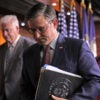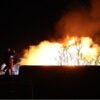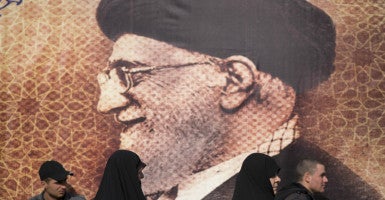As the U.S. and Iran aim to position their nuclear deal to the public, a new provocation by Iran’s supreme leader, experts say, was meant to show there remain limits to the countries’ relationship.
On Sunday, Ayatollah Ali Khamenei awarded medals to the navy commanders who captured U.S. sailors last month.
According to Iran’s state media, Khamenei awarded the Fat’h (Victory) medal to the head of the navy of the Iranian Revolutionary Guard Corps and four commanders involved in the seizure of two U.S. Navy boats.
Since 1989, the Fat’h medal has been given to war heroes, military commanders, and politicians, Reuters reported.
“It is most assuredly a propaganda move meant for internal consumption,” said Richard Nephew, a former State Department official who served as the lead sanctions expert for the U.S. team negotiating the nuclear deal with Iran.
“The Iranian government has a prevailing fear of insecurity and inferiority, some of which is linked back to us and our history,” Nephew continued in an email to The Daily Signal. “They see this as an opportunity to tell their people that they can stand up to us.”
Last month, Revolutionary Guards naval forces detained 10 U.S. Navy sailors after their two small boats drifted into Iranian territorial waters.
The incident occurred just as the U.S. and Iran were preparing to announce the implementation of the nuclear deal and in the midst of finalizing a prisoner swap that led to the release of four Americans who were imprisoned in Iranian jails.
The U.S. sailors were released a day after they were detained, and the Obama administration hailed the swift resolution as a sign of diplomatic progress between two countries who had just negotiated a historic nuclear deal.
But critics of the nuclear deal, and U.S. policy toward Tehran, believe that the capture of the sailors signified American weakness.
“The only people who are surprised by this latest provocation are people who expected this regime to change course,” said Emanuele Ottolenghi, a senior fellow at Foundation for Defense of Democracies.
“The Iranians took American personnel hostage right in the middle of finalizing the nuclear deal because they didn’t think there’d be a significant price to pay for this action,” Ottolenghi continued in an interview with The Daily Signal.
Ottolenghi contends that the Obama administration has downplayed the capture of the U.S. soldiers, which he says will discourage American allies in the Middle East who are concerned about how Iran will act now that it is freed of major economic sanctions—and external pressure.
“The administration is being way too coy about this thing,” Ottolenghi said. “They don’t seem to appreciate that beyond the expediency of the specific dynamics of that incident and what was transpiring at the time with the implementation of the nuclear deal, there are long-term consequences to U.S. military personnel in the Persian Gulf, who are there to protect the freedom of the seas, being humiliated, with no price exacted on Iran. This incident is nothing compared to America’s aloofness in Syria, but it adds up to American allies believing America doesn’t have their back.”
Nephew, however, argues that the Obama administration would be wise to put the situation in context, and not to respond in kind to Iran’s celebratory reaction to it.
“As for what we should read into it, I think that we should ignore it,” Nephew said. “The reality is that a few of our guys went into Iranian waters accidentally. They got picked up and got released. Our guys reacted coolly, calmly, and—so far as I am aware—within their training. And we’re hardly humiliated because of it. That Iran is seeking to suggest otherwise is embarrassing for them, not us.”






























